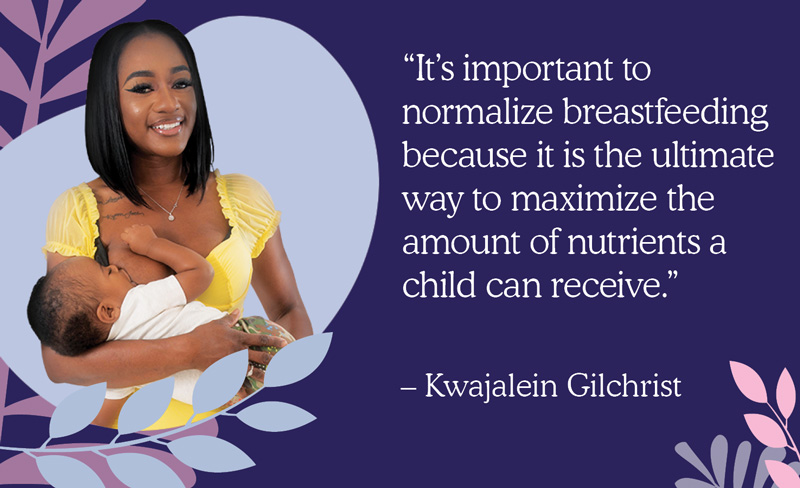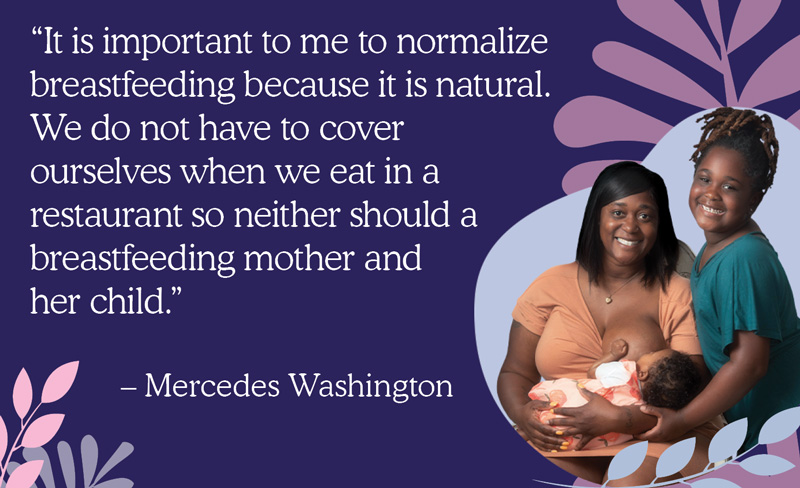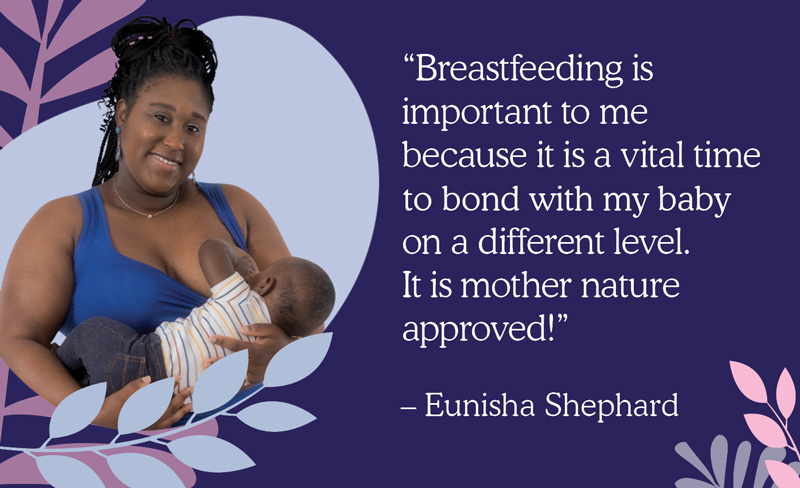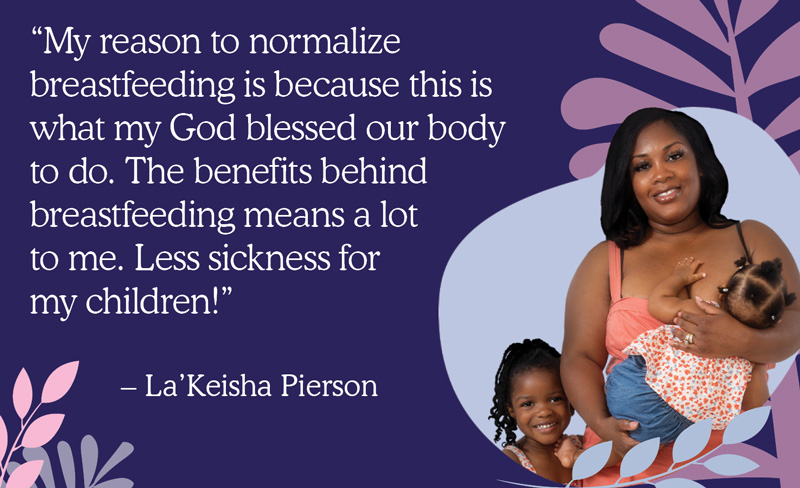
The Wellness Coalition (TWC) is launching its annual campaign to raise awareness about the importance of breastfeeding for mothers and babies, particularly in African American communities, in honor of National Breastfeeding Month.
“African American women have the lowest rates of breastfeeding compared with other racial and ethnic groups,” said Delia Hasberry, REACH program coordinator for The Wellness Coalition. “Minority women experience unique barriers to breastfeeding, including less acceptance at home or work and a lack of access to resources and support.”
According to the Centers for Disease Control and Prevention, breastfeeding disparities affecting minorities include:
- Fewer non-Hispanic black infants (69.4 percent) are ever breastfed compared with non-Hispanic white infants (85.9 percent) and Hispanic infants (84.6 percent).
- Black infants are 21 percent less likely to have ever been breastfed than white infants.
- Mothers ages 20 to 29 years are less likely to ever breastfeed (80.4 percent) than mothers age 30 years or older (85.3 percent).
TWC National Breastfeeding Month Events
The Wellness Coalition provides resources and coordinates support groups to address breastfeeding disparities and to help normalize breastfeeding. In honor of National Breastfeeding Month, TWC will also:
- Place life-size cutouts of local moms breastfeeding their babies in locations throughout the River Region. Images of these moms will also be featured on local billboards, social media, and newspaper advertisements throughout the month of August.
- Provide free weekly virtual support groups in collaboration with River Region Lactation every Friday at 11:00 a.m. through September 30, 2022. Participants can register for a group at: bit.ly/BFGROUP.
- Host a free online breastfeeding summit on Wednesday, August 31, 2022 from 9:00 a.m. to 12:00 p.m. This event will cover the effects of chronic health conditions on breastfeeding and solutions to common issues. The virtual summit is ideal for moms, moms-to-be, support persons, lactation professionals, and anyone who wants to learn more about breastfeeding.
“Breastfeeding is a way of life. It is the most intimate, precious, bonding time you will ever get with your child,” said Eunisha Shephard, a breastfeeding mother in Montgomery. “Besides it being the healthiest form of food for my baby, it is also convenient and readily available. With a national shortage of food and recalls on formula, why wouldn’t you want to breastfeed? Our bodies were made for this, so I hope people can stop acting weird when they see a mother nursing her child in public.”


Breastfeeding Recommendations
Most mothers want to breastfeed but stop early due to a lack of ongoing support. Certain factors make the difference in whether and how long infants are breastfed. The American Academy of Pediatrics recommends that infants be exclusively breastfed for about the first six months with continued breastfeeding along with introducing appropriate complementary foods for one year or longer. WHO also recommends exclusive breastfeeding up to six months of age with continued breastfeeding along with appropriate complementary foods up to two years of age or longer.
Mothers should be encouraged to breastfeed their children for at least one year. The longer an infant is breastfed, the greater the protection from certain illnesses and long-term diseases. The more months or years a woman breastfeeds (combined breastfeeding of all her children), the greater the benefits to her health as well.
Health Benefits of Breastfeeding
Breastfeeding has health benefits for both babies and mothers. Breast milk provides a baby with ideal nutrition and supports growth and development. Breastfeeding can also help protect baby and mom against certain illnesses and diseases. Babies who breastfeed have a lower risk of:
- Asthma
- Diabetes (type 2)
- Eczema (a skin disease)
- Gastrointestinal infections (diarrhea/vomiting)
- Infections (ear, respiratory)
- Inflammatory bowel disease
- Necrotizing enterocolitis (NEC) for preterm infants
- Obesity
- Sudden Infant Death Syndrome (SIDS)
- Mothers who breastfeed their babies have a lower risk of:
- Breast and ovarian cancers
- Diabetes (type 2)
- High blood pressure


A Summary of the Benefits of Breastfeeding
- Breast milk is the best source of nutrition for most babies. As the baby grows, the mother’s breast milk will change to meet her baby’s nutritional needs.
- Breastfeeding can help protect babies against some short- and long-term illnesses and diseases. Breastfed babies have a lower risk of asthma, obesity, type 1 diabetes, and sudden infant death syndrome (SIDS). Breastfed babies are also less likely to have ear infections and stomach bugs.
- Breast milk shares antibodies from the mother with her baby. These antibodies help babies develop a strong immune system and protect them from illnesses.
- Mothers can breastfeed anytime and anywhere. Mothers can feed their babies on the go without worrying about having to mix formula or prepare bottles. When traveling, breastfeeding can also provide a source of comfort for babies whose normal routine is disrupted.
- Breastfeeding can reduce the mother’s risk of breast and ovarian cancer, type 2 diabetes, and high blood pressure.
“Breastfeeding provides unmatched health benefits for babies and mothers,” said Dr. Ruth Petersen, director of CDC’s Division of Nutrition, Physical Activity, and Obesity. “It is the clinical gold standard for infant feeding and nutrition, with breast milk uniquely tailored to meet the health needs of a growing baby. We must do more to create supportive and safe environments for mothers who choose to breastfeed.”
Providing Breast Milk After Returning to Work or School
Being prepared for returning to work or school can help a mother ease the transition and continue to breastfeed after her maternity leave is over. When a mother is away from her infant, she can pump or hand express her breast milk so that her infant can drink breast milk from a bottle. Mothers who are expressing their breast milk should visit the CDC’s Proper Storage and Preparation of Breast Milk website to learn how to prepare and store breast milk safely for her infant.
The Patient Protection and Affordable Care Act (ACA) requires employers to support breastfeeding mothers to express breast milk for one year after each child’s birth by providing mothers with reasonable break time and a private, non-bathroom space to express their breast milk.
“Breastfeeding is one of the most important choices a mother can make for her baby’s health,” said Hasberry, “We hope that by providing support and highlighting local moms who choose to breastfeed, we can continue normalizing breastfeeding in our community.”
Learn more and get free resources at thewellnesscoalition.org/breastfeeding.
